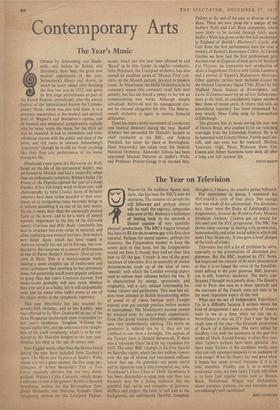Contemporary Arts
The Year's Music
OPERAS by Schoenberg and Hinde- mith, and ballets by Britten and Stravinsky, have been the great new musical experiences of the year. Schoenberg's Moses and Aaron, to which he never added after finishing the first two acts in 1932, was given its first stage performance as part of the Zurich Festival, immediately after the annual festival of the International Society for Contem- porary Music, which was also held there. It is a dramatic masterpiece at the musical and spiritual level of Wagner's and Beethoven's operas, and its musical and emotional completeness explains why he never wrote the music for the third act that he intended. It had an immediate and over- whelming success with the public and most of the press, and did more to advance Schoenberg's 'popularity' (though he is still far from anything like that) than any performance of his music during his life.
Hindemith's new opera Die Harmonic der Welt, based on the life of the astronomer Kepler, was performed at Munich and had a respectful rather than an enthusiastic reception. Britten's ballet The Prince of the Pagodas opened the year at Covent Garden. It is a full-length work in three acts, with choreography by John Cranko. Some of Britten's admirers have been rather guarded in their com- ments on it, recognising many beautiful things in it without admitting it as one of his best works. To me it seems finer than the universally praised Turn of the Screw, and to be a work of almost operatic importance in the line of his full-scale operas Gloriana and Billy Budd—inevitably less taut in structure but even richer in material, and often exploring new musical territory. Stravinsky's new ballet Agon, which has been staged in America recently but not yet in Europe, was con- ducted by the composer in a concert performance at one of Pierre Boulez's Domaine Musical con- certs in Paris. This is a twenty-minute work, making a more complex use of twelve-note and serial techniques than anything he has previously done, but potentially much more popular and easy to grasp than last year's Canticum Sacrum. Few music-lovers probably will care much whether they ever see it as a ballet, but it will undoubtedly soon join his many other ballet scores as one of his major works in the symphonic repertory.
This year Stravinsky has also reached his seventy-fifth birthday, and so has Kochily, who was referred to by Herr Grotewohl as one of the three Hungarian intellectuals most responsible for last year's revolution. Vaughan Williams has turned eighty-five, and has announced the comple- tion of his ninth symphony, which is to be con- ducted by Sir Malcolm Sargent in the new year. Sibelius has died at the age of ninety-one.
New English works other than the Britten heard during the year have included John Gardner's opera The Moon and Sixpence at Sadler's Wells, which was not a great success; the first stage per- formance of Arthur Benjamin's Tale of Two Cities, musically effective but not very distin- guished; Walton's Cello Concerto, which shows a welcome revival of his powers; Rubbra's Seventh Symphony, written for the Birmingham Sym- phony Orchestra; and Malcolm Arnold's Third Symphony, written for the Liverpool Philhar- monic, which has this year been allowed to add `Royal' to its title. Under its regular conductor, John Pritchard, the Liverpool orchestra has also started an excellent series of `Musica Viva' con- certs, on the Munich pattern, devoted to modern music. In Manchester the Halle Orchestra is in its centenary season (the centenary itself falls next month), but has not found a penny to lay out on commissioning new works. Although stingily subsidised, Barbirolli and his management can- not be excused altogether for this. The Bourne- mouth orchestra is again in serious financial difficulties.
There has been a lively movement of conductors and musical directors during the year. Rudolf Schwarz has succeeded Sir Malcolm Sargent as chief conductor at the BBC, and Andrzej Panufnik has taken his place at Birmingham. Hans Swarowsky has taken over the Scottish National Orchestra. Alexander Gibson has been appointed Musical Director at Sadler's Wells, and Professor Procter-Gregg is to succeed Mrs. Phillips at the end of the year as director of Carl Rosa. There are now plans for a merger of the Sadler's Wells and Carl Rosa companies, which seem likely to be carried through fairly soon. Sadler's Wells has given us the first full production in England of Bartok's Bluebeard's Castle, and Carl Rosa the first performance here for over a century of Berlioz's Benvenuto Cellini. At Covent Garden we have had the first professional prod duction ever in England of both parts of Berlioz's Les Troyens, an impressive new production of Aida, a inagnificent Elektra with Gerda Lammers, and a revival of Tippett's Midsummer Marriage. Other operatic rarities have included Ernani by the Oxford University Opera Club, Rienzi by the Midland Music Makers at Birmingham, and Lucia di Lammermoor by an ad hoc Italian com- pany at the Stoll, of considerably higher standard than those of recent years. A return visit with an astonishing repertory has been announced for next month. Mme Callas sang La Sonnambula at Edinburgh.
The greatest loss to music during the 'year was of Dennis Brain, who crashed in his car returning overnight from the Edinburgh Festival. He is to be lamented with Ginette Neveu, Ferrier and Can- telli, and can even less be replaced. Sibelius, Toscanini, Gigli, Pinza, Professor Dent, Eric Coates and Albert Sammons have died, all after a long and full musical life.
COLIN MASON


























 Previous page
Previous page